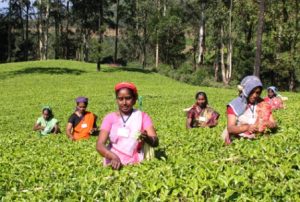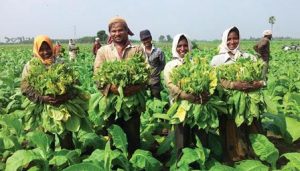Plantation Workers Amidst Pandemic: Unearthing Their Challenges
With the reverse migration in the context of the COVID-19, the entire focus is on MGNREGA, and hence one has to look beyond the policies and think of a cooperative system.
Plantation sector and its workers have a story to itself since colonial times in the form of Brown-sahibs to huge land grabs to workers exploitation. When it comes to this  particular Unlock1:0 in the present times, the work has begun but the workers who are on the forefront are bearing the brunt of the pandemic. Cotton, tea, sugarcane and tobacco farming have started working in full-swing and the workers, both the regular and contractual, are also back in full numbers. There is a high chance that workers in the plantation sector will be facing more hardships due to the peak time of the community transmission. The 18th edition of COVID-19 Voices of the Margin webinar series, organised by Praxis and Partners in Change (PIC), focused on unearthing the many such challenges faced by plantation workers during the pandemic. Experts from the sector, including farmers, activists and supporters, shared their views in the webinar.
particular Unlock1:0 in the present times, the work has begun but the workers who are on the forefront are bearing the brunt of the pandemic. Cotton, tea, sugarcane and tobacco farming have started working in full-swing and the workers, both the regular and contractual, are also back in full numbers. There is a high chance that workers in the plantation sector will be facing more hardships due to the peak time of the community transmission. The 18th edition of COVID-19 Voices of the Margin webinar series, organised by Praxis and Partners in Change (PIC), focused on unearthing the many such challenges faced by plantation workers during the pandemic. Experts from the sector, including farmers, activists and supporters, shared their views in the webinar.
Datta Kumar Darne, a farmer having 25 acres of land and 20 years of farming experience from Yavatmal in Maharashtra, voiced the issues he faced while selling cotton during the lockdown and the troubles related to market price and procurement.He shared that after the lockdown the farming activities ceased and all the Rabi and Kharif harvests, mainly cotton, went waste. “We have been trying to sell these in private markets and have lost around Rs 1500 per quintal on cotton becauseof the difference in the rates at which we have sold to private entities as compared to what the standard market rates should be”, Darne said. The other issue that he voiced was of agricultural labour. Since migrant labours were the major labour force, because of the lockdown and social distancing, they too were not available. Apart from this, unavailability of fertilisers has affected the soil rejuvenation which is believed to impact the next crop too. “The large farmers are losing close to 2.5 to 3.25 lakh each during this period. We urgently demand compensation towards losses amidst lockdown, as we don’t know how to deal with labour shortage issues and related losses as the police and the health department will stop the labours. If all this persists how are we to grow and harvest?”, asked Darne.
Jeevan Dasu Ade, another medium-scale farmer with four acres of land, shared that he is perplexed by the new online systems introduced in procurement.“Since I was not able to do the online formalities, I have lost Rs 1000 per quintal on cotton on an average. Not only me, but most of the small land-holding farmers have been going through lots of issues due to the lockdown amidst COVID-19”, he shared. To add on to the challenges, the government is also not addressing to the hardships faced by the small land-holding farmers.
Taking advantage of the situation, local agricultural officers were discriminating against the small farmers by offering assistance to big farmers only.
Also Read : Secure Land Rights Critical for Asia’s Rural Communities Threatened by COVID-19
A similar concern was raised by Hosur Kumar, a farmer from Mysore District and the President of the Mysore District Farmers Forum. “During the lockdown there has been less availability of transport and as a result we had to incur more cost. Also, overall crop has been less compared to the previous year due to unavailability of manure during lockdown, and the previous year’s crop had to be sold at extraordinarily little price”, he said.
Gangabishan Tharve, an activist associated with Shetkari Sangharsh Samiti, working to collectivize agricultural workers for last 25 years in Beed, Maharashtra, shared that even though the sugar lobby was dependent on Beed workers, still they were not taken care of by the factories. The diligent workers of the factory were not allowed inside village and the relief measures offered by the State were to be obtained from the banks, which became an impossible task for them as the cooperative banks did not even disbursed crop loans tothe farmers, who had paid their dues regularly. “Last year Maharashtra government in Marathwada region offered insurance, but this year no company has offered insurance scheme in this area. Fertiliser and seeds are in shortage, and hence the farmers had to sell gold and other forms of jewellery to do the sowing due to lack of crop loans”, Tharve shared. He also shared that there was a dire need for crop loan, debt waiver, and procurement so that the money that the farmers had borrowed can be returned.
Bringing in the ground reality of the tea workers in Assam, Sonia Tanti, the Secretary of Jorhat District Unit of All Adivasi Women Association of Assam (AAWAA), and its central committee member, shared that the tea workers were not even made aware of the pandemic by their employers. Apart from this, necessary facilities like drinking water,toilets, crèche medical professional and an ambulance were also not provided to the workers at the work place.During the lockdown, even the ration was provided with the help of an NGO and not the government. “How people will survive?” was an important question that she raised.With only an allocation of Rs 500, which only a few received and education going online boththe workers and their children in tea gardens were left deprived.
 Adding on, Stephen Ekka, Director of Pajhra, an indigenous organisation working for the tea workers in Assam and with AAWAA, shared that the daily wage of the plantation workers is much below the minimum wage of any labour in other sectors. However, this issue too remains unaddressed as no one is allowed to organise any meeting inside the tea gardens, be it an NGO or any association, which is the violation of the worker’s basic human rights. “There is a lack of implementation of rules and law in the tea gardens by the government even though the local government bodies are present. MGNREGA too does not work here and no housing quarters are there for the workers apart from a handful of them who could avail government’s Awas Yojana”, he said. Other concerns that Ekka raised were unavailability of ration due to lack of ration cards, unsupportive banking system leading to inaccessibility of Jan Dhan Yojana and high number of drop-outs due to unavailability of education in worker’s own tribal language, as state language is preferred.
Adding on, Stephen Ekka, Director of Pajhra, an indigenous organisation working for the tea workers in Assam and with AAWAA, shared that the daily wage of the plantation workers is much below the minimum wage of any labour in other sectors. However, this issue too remains unaddressed as no one is allowed to organise any meeting inside the tea gardens, be it an NGO or any association, which is the violation of the worker’s basic human rights. “There is a lack of implementation of rules and law in the tea gardens by the government even though the local government bodies are present. MGNREGA too does not work here and no housing quarters are there for the workers apart from a handful of them who could avail government’s Awas Yojana”, he said. Other concerns that Ekka raised were unavailability of ration due to lack of ration cards, unsupportive banking system leading to inaccessibility of Jan Dhan Yojana and high number of drop-outs due to unavailability of education in worker’s own tribal language, as state language is preferred.
After listening to the woes of the cotton, tea, sugarcane and tobacco plantation workers, Chandan Kumar, National Coordinator, Working Peoples’ Charter and a member of National Minimum Wage Advisory Board (a statutory committee of the Government of India) and NHRC Core Group on Bonded Labour, said:
“The question that is before us is how the government is adopting mechanisms to lower the impact on the agriculture support system after ending the APMC law?Do they now want to open the market which will impact the small workers, traders and all those people involved in this?”
Also Read : Revoke and Reframe the Draft EIA: Demands MAKAAM
Another issue that he raised was that of the impact on small farmers who were not getting any relief as compared to the companies, who were getting a rebate under MSME. Secondly, with reverse migration in action, MGNREGA does not have the strength at the moment to provide working opportunities for everyone, and hence it is creating chaos in the village. “I feel that we need to build idea about agriculture cooperatives. We should think of how we could build a stronger economy in the village through collective initiation”, he suggested. With instances of tea gardens being closed and employers threatening to shut the gardens when the workers demanded their rights, there is a need for a process of trade unions of safe tea garden and closed tea gardens and a need to negotiate and discuss the issue of tea plantation workers with the Tea Boards or Association, Chandan stressed.
Lastly, Dr Nayantara Nayak, Professor and In Charge and Director, Centre for Multidisciplinary Development Research, Dharwad, brought forward the situation of agricultural workers of Karnataka and India. “As I understand the season of cropping was over since the lockdown was announced, butin Karnataka, for the cultivation, a lot of migrant labourers from Andhra Pradesh are needed. The traders are facing trouble as the tobacco needs to be processed and with transportation issue, if they do not have any good storage system, they might face loss”, he shared.
When talking about farmers, we should talk beyond the terms of cash crops, as there is a high demand of food crops in market. There has to be a balance where one can produce both cash crops and food crops, as well to engage with the market. Going for food crop completely creates a dilemma for a farmer at this juncture. Moreover, there is a need to strengthen the current procurement system. We need to go beyond the idea of protection of various identities such as landless farmers, Dalit, Adivasi farmers or women farmers.
